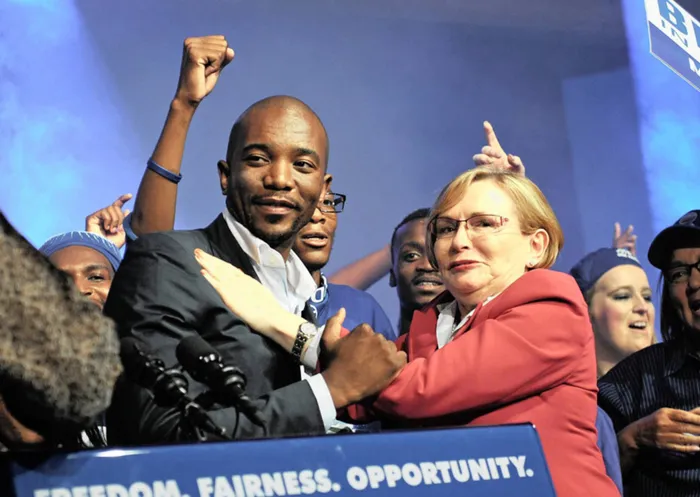Maimane ‘makes history’

100515. Boardwalk Convention Centre in Nelson Mandela Bay, Port Elizabeth. The Democratic Alliance elected Mmusi Maimane as leader today, making him the first black leader of the party. He succeeds Helen Zille, who has decided to bow out after years at the helm of the country's chief opposition party. The Democratic Alliance sixth Federal Congress in Port Elizabeth is the party's highest decision-making body, constitutionally required to meet every three years. 440 Picture: Dumisani Sibeko 100515. Boardwalk Convention Centre in Nelson Mandela Bay, Port Elizabeth. The Democratic Alliance elected Mmusi Maimane as leader today, making him the first black leader of the party. He succeeds Helen Zille, who has decided to bow out after years at the helm of the country's chief opposition party. The Democratic Alliance sixth Federal Congress in Port Elizabeth is the party's highest decision-making body, constitutionally required to meet every three years. 440 Picture: Dumisani Sibeko
Shanti Aboobaker
NEWLY elected DA federal leader Mmusi Maimane has clarified that the party is in favour of non-racialism – but will not advocate for colour-blindness, because South Africa’s history of racism has shaped millions of black people.
“I simply don’t agree with those who say they don’t see colour. Because, if you don’t see that I’m black, then you don’t see me,” he said.
The party’s first black leader also broke the DA’s silence on the controversial comments made by veteran journalist and outgoing leader Helen Zille’s friend, Allister Sparks, at the weekend that apartheid’s architect, Hendrik Verwoerd, was a “smart” politician.
“I know Allister Sparks. He’s written profound things, he fought against apartheid. (But) I disagree with his comment,” Maimane told journalists.
“We cannot pretend that apartheid never happened. We cannot ignore the fact that apartheid was a system that defined us by the colour of our skin,” he said during his maiden speech.
“This doesn’t mean our skin colour must define us forever. The system of racial classification devised by Hendrik Verwoerd was evil and deplorable, and we cannot stay trapped in that way of thinking.”
Maimane also outlined the party’s policies aimed at redressing the “legacy of the past”. This included a commitment to:
l Providing social security to protect people from extreme poverty.
l The delivery of basic services such as water, electricity and sanitation.
l A focus on stopping inferior education.
l And, above all, pushing for economic growth and job creation.
Maimane also said the party would show its outrage not only over rampant corruption in the country, but would reinforce its message on the economy.
“As a party we are quick to get angry about the sustained attack on our constitution and our institutions. But we must be equally angry at the insider-outsider economic policies that have trapped too many of our people in poverty for far too long,” he said.
Calling for state intervention, he said the DA would “structure the economy” so the youth could start small businesses, by using state-owned enterprises as skills incubators and by offering apprenticeships.
He also repeated the party’s calls for greater efforts in the roll-out of the youth wage subsidy, which the Treasury controversially implemented last year.
“We need a job-creating labour regime where trade unions protect their members, but not at the expense of keeping unemployed people locked out of the economy.”
The DA also amended its constitution to reflect what it calls the “values charter” – aimed at breaking down its founding principles to non-traditional communities that did not understand what the party’s “open opportunity society” means in real terms.
“Our values can be summed up in these three words: freedom, fairness and opportunity,” Maimane said.
In a nod to its liberal tradition, he emphasised the centrality of individual freedom in making life choices, repeating the DA’s commitment to fighting racial, gender and homophobic discrimination.
Maimane also preached unity, saying he would be meeting Wilmot James, who challenged him for the position of federal leader, and former leader Zille about the roles they could continue to play.
While James’ role is as yet undefined, he hinted that Zille could be asked to continue with fund-raising the considerable cash the party needs for its ambitious plans to contest next year’s municipal elections.
Speaking to Independent Media, James said he was proud of the precedents he set in running for the position of leader, including his calls for transparency over party funding.
The party also announced that newly elected federal chairman Athol Trollip will be its mayoral candidate in Nelson Mandela Bay Metro, where the ANC got less than 50 percent in last year’s general elections. Trollip beat promising young MP Makashule Gana for the position.